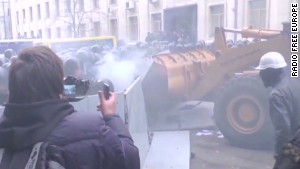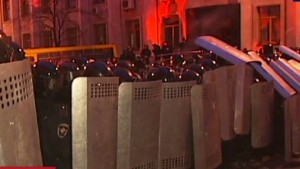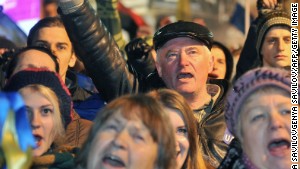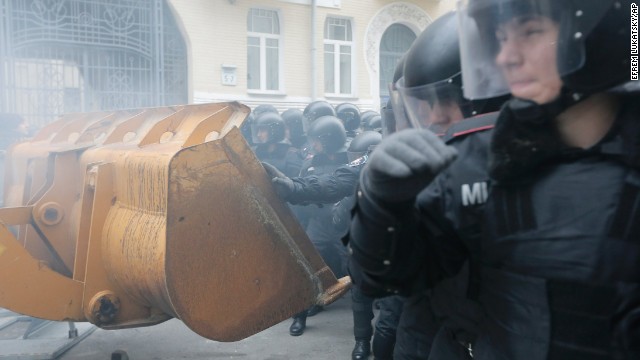Ukraine protesters block government offices, call for strike
December 2, 2013 -- Updated 1922 GMT (0322 HKT)
STORY HIGHLIGHTS
- Protesters block government offices, close streets
- Protest leader: "This is not a protest. This is a revolution"
- Protesters have called for a nationwide strike, beginning Monday
- New: Russian President Vladimir Putin dismisses protest as campaign gimmick
Kiev, Ukraine (CNN) -- Protesters blocked the Ukrainian government's main headquarters and closed off streets Monday, stepping up their campaign against President Viktor Yanukovich in the Eastern European country's biggest demonstrations since the Orange Revolution nine years ago.
Angry about Kiev's policy U-turn away from integration with Europe, hundreds of demonstrators lined trash bins, metal containers and flower pots to stop employees from going to work. They focused their attention on government offices after tens of thousands of people took part in an opposition-led rally Sunday, marred by violence.
Nearby, more demonstrators, braving the cold weather while waving flags and chanting against the government, converged on Kiev's Independence Square and surrounding streets, setting up tents and blocking traffic, in response to an opposition call for a nationwide strike over Yanukovich's switch toward Russia.
Russian President Vladimir Putin dismissed the protests Monday, saying they are unrelated to Ukraine's turn away from the European Union. He called them reminiscent of a "pogrom" rather than a revolution and an effort by the opposition to destabilize the government, according to Russia's state news agency RIA Novosti.
"These actions are, in my opinion, prepared not in view of current events, but for the 2015 election campaign," Putin said.



Ukraine's Orange Revolution in late 2004 was a massive populist movement that booted Yanukovich, then Prime Minister, from office.
This time, the protesters say they want Yanukovich out for good.
"There is no turning back, we have reached the point of no return," protester Sergey Vysotsky told CNN. "Now the whole future is in the hands of those people," the demonstrators.
The protesters have called for a nationwide strike, and a mass rally was planned for later Monday to boost support for that.
What started out late last month as demonstrations against Yanukovich's decision not to sign a landmark trade deal with the European Union has ballooned into something much larger. Demonstrators say they will stop at nothing short of new parliamentary and presidential elections.
"This is not a protest. This is a revolution," protest leader Yuri Lutsenko, told a crowd of thousands who packed Independence Square on Sunday.
"Revolution! Revolution!" the crowd chanted.
The government, however, isn't going down without a fight.
The peaceful Sunday rally took a turn when demonstrators tried to push through barricades at the President's administration building using a bulldozer. They were met with stun grenades and tear gas.
Then, after dark, the batons came out; police chased and beat protesters.
Dozens were hurt on both sides. The National Union of Journalists said 40 journalists were injured during the protests.
How it began
At the heart of the protests is Ukraine's about-turn after a year of insisting that it was intent on signing a historic political and trade agreement with the European Union.
The deal, the EU's "Eastern Partnership," was aimed at creating closer political ties and generating economic growth among the nations of Eastern Europe and the Caucasus, including Ukraine, Moldova, Georgia, Armenia, Azerbaijan and Belarus.
On November 21, Yanukovich's government decided to suspend talks with the EU, angering Ukrainians.
The agreement with the EU would have opened borders to trade, and set the stage toward modernization and inclusion, they said.
Why Yanukovich backpedaled
Yanukovich had his reasons for backpedaling on the deal. Chief among them was Russia's opposition to it.
Russia threatened its tiny neighbor with trade sanctions and steep gas bills if it forged ahead.
If Ukraine didn't, and instead joined a Moscow-led Customs Union, it would get deep discounts on natural gas, Russia said.
There also was a second reason -- a more personal one.
Yanukovich also was facing a key EU demand that he was unwilling to meet: Free former Prime Minister Yulia Tymoshenko, his bitter political opponent. The Orange Revolution that swept him from office also swept Tymoshenko to power.
Two years ago, she was found guilty of abuse of office in a Russian gas deal and sentenced to seven years in prison in a case widely seen as politically motivated. Her supporters say she needs to travel abroad for medical treatment.
Yanukovich "has decided it's more important to keep Tymoshenko in prison than to integrate Ukraine closer toward Europe," said David Kramer of Freedom House, a U.S.-based nongovernmental organization.
"He has left his country vulnerable to Vladimir Putin's threats and pressure," he said. That legacy will belong to Yanukovich "if he doesn't reverse course."
What happens next
Volodymyr Rybak, speaker of the Ukrainian Parliament, called for roundtable discussions, according to his media service. But rather than running out of steam, the protests seem to be swelling.
Some demonstrators are even traveling from far away to reach the capital.
"The reason (for going to Kiev) is very simple: to stand up, today, for ourselves and for those young people, women, who went to Maidan (Independence Square)," Andriy Kornat told Reuters.
Kornat arranged for protesters to travel to Kiev from Lviv, more than 300 miles away on the other side of the country.
Mindful that violence will only beget more violence, Vitaly Klitschko, one of the protest leaders, urged for calmer heads to prevail.
"We should not be provoked. There are a lot of provocateurs," he said at his Sunday speech at Independence Square. "We can change the power in a civilized way."
On Monday, protesters listened to opposition leader speeches and music as they staged their demonstration. Traffic was limited around the city center, but it was difficult to evaluate how much support the opposition's call for a general strike was receiving.
At a news conference, opposition leaders, who want to oust the Cabinet in a confidence vote in parliament, said they are demanding early presidential and parliamentary elections.
"That's a key demand not only from the Ukrainian opposition, but from the entire Ukrainian nation," said Arseniy Yatsenyuk, leader of the Motherland opposition party.
How the government will respond
Ukrainian Interior Minister Vitaliy Zakharchenko apologized for the government's response Sunday, saying riot police abused their power. Kiev's police chief resigned.
But Zakharchenko also had a warning for the protesters.
"If there are calls for mass disturbances," he said, "then we will react to this harshly."
European Commission President Jose Manuel Barroso called on Ukrainian authorities to respect the freedom to demonstrate but also called on the protesters to show restraint.
"We hope the dialogue will continue, that calm will be respected so we can address these issues in a way that is good for Ukraine and for all of us here," he said.
Journalist Victoria Butenko reported from Kiev and CNN's Marie-Louise Gumuchian from London. CNN'S Jessica King and Jonathan Mann also contributed from Atlanta.
We recommend
From around the web
Manufacturing lessons from Germany(TradeGood)
How American taxpayers are funding Palestinian terrorism(The Times of Israel)
December 2, 2013 -- Updated 1316 GMT (2116 HKT)
Travel to North Korea raises some sticky issues, not least the ethical issue of supporting the regime. When you sign up, you have to play by the rules.
December 2, 2013 -- Updated 1555 GMT (2355 HKT)
Syrian regime forces are battling rebels for control of suburbs surrounding Damascus, which could be key to the outcome of civil war.
December 2, 2013 -- Updated 1132 GMT (1932 HKT)
Is the Central African Republic the world's next Rwanda? The country is teetering on the brink, but Paul Melly says it can still be pulled back.
December 2, 2013 -- Updated 1455 GMT (2255 HKT)
Paralysed by polio as a baby, Paulo Machado has spent almost his whole life in hospital, but refuses to let this stop him leading a full life.
December 2, 2013 -- Updated 1346 GMT (2146 HKT)
Not interested in credit default swaps or commodity derivatives? What about a product with a little more va-va-voom: vintage cars.
December 2, 2013 -- Updated 1601 GMT (0001 HKT)
Headlines show that the American public is troubled by government secrecy. But what should be done to address these concerns is less clear.
December 2, 2013 -- Updated 0049 GMT (0849 HKT)
China's "Jade Rabbit" lunar mission will carry high-precision space tools mimicking chopsticks and Chinese ceramic soup spoons.
December 2, 2013 -- Updated 0458 GMT (1258 HKT)
Is this the future of deliveries? Watch a short video from Amazon showing how goods could come by air directly to your doorstep in the future.
December 2, 2013 -- Updated 1445 GMT (2245 HKT)
Tablet sales are predicted to overtake PCs and laptops by 2015. So why are 60% of the Fortune 1000 companies still ignoring the platform?
December 2, 2013 -- Updated 0440 GMT (1240 HKT)
As tensions ratchet up in East Asia, CNN goes on exercise with the USS George Washington -- the flagship aircraft carrier of the Japanese-based 7th Fleet.
December 2, 2013 -- Updated 1433 GMT (2233 HKT)
Forget diamonds. Emerald prices have been going through the roof, and bidders will go to extraordinary lengths for them.
December 2, 2013 -- Updated 2020 GMT (0420 HKT)
Stunned by his untimely death, fans, friends and family remembered actor Paul Walker -- what he meant to them and what he did for them.
Most Popular
Today's five most popular stories
53°
HI 56°LO 47°
Atlanta, GAWeather forecast
Home | Video | World | U.S. | Africa | Asia | Europe | Latin America | Middle East | Business | World Sport | Entertainment | Tech | Travel | iReport
Tools & Widgets | RSS | Podcasts | Blogs | CNN Mobile | My Profile | E-mail Alerts | CNN Shop | Site map | CNN Partner Hotels

 Protesters use a bulldozer during clashes with police at the presidential office in Kiev, Ukraine, on Sunday, December 1. At least 100,000 anti-government protesters packed Independence Square on Sunday. Riot police lined up to protect the office of President Viktor Yanukovych, whose decision not to sign a landmark trade deal with the European Union sparked the public outrage.
Protesters use a bulldozer during clashes with police at the presidential office in Kiev, Ukraine, on Sunday, December 1. At least 100,000 anti-government protesters packed Independence Square on Sunday. Riot police lined up to protect the office of President Viktor Yanukovych, whose decision not to sign a landmark trade deal with the European Union sparked the public outrage. 






























No comments:
Post a Comment